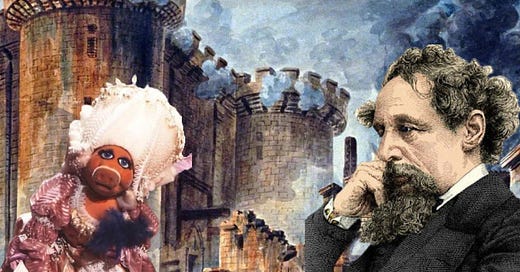Lesson 3: A beginner's guide to Charles Dickens & A TALE OF TWO CITIES
The Revolution Will Not Be Muppetized
You’re probably wondering why I’m about to yap about Fran Leibowitz.
Leibowitz—who at first glance I would not put in Austen’s camp, but Team Jane has a big tent—says in the documentary short, “The Divine Jane”:
Any artist who has that quality of timelessness has that quality because they tell the truth. Obviously, details change, but writers who date date not because the details date. All details date. Writers date because their ideas date, and that means their ideas are wrong. Her perceptions don’t date, because they are correct, and they will remain that way until human beings improve themselves intrinsically, and this will not happen.
I want this quote in sloppy handwriting on a creased index card and thumbtacked on my wall. If I was fully equipped in office supplies, my security deposit would be in big trouble. Heck, I could paint it on the wall with this set of paint from two years ago! I don’t have thumbtacks, but I have a set of paints from Target!
Vive Le Leibowitz! Down with the landlords!
My landlord, for what it’s worth, is incredibly nice. He will never read this, and I will defend his honor. That’s how nice Vincent is! His decency is the only civility preventing me from slathering Fran Leibowitz quotes on his walls!
[coughs politely]
Anywho.
To the living and ignorant historian—me—there is a youthful sense that Austen and Dickens would have existed in the same timeline as British writers. However, Austen would have been the old guard of the regency, while Dickens became THE face of novels during the Victorian era. She dies anonymously when he’s five years old. So, despite my initial instinct, wouldn’t put them as contemporaries, despite sharing the same country and century.
That being said, this Leibowitz quote connects why I see them as peas in a pod, despite their polar opposite lives of recluse and fame. Both can paint a villain who exists across centuries. They point to greed and pride as flaws we, in any year, can mock. Goodness—humility, compassion, self-sacrifice, justice—can belong to anyone, and unlike the feudal systems of power, they belong to people of any class.
Dickens, like Austen, can make us laugh about these structures, long after they’re eroded, because their inherent vices still exist today.
Who was Charles Dickens?
Part of me has been blasé on Dickens, and I blame Christmas Carol. Like a word repeated until it is just a guttural sound, the story loses its flavor when you see everyone from Miss Piggy to Bill Murray have their way with it. That’s not to say I don’t like Christmas Carol, but if I can tell exactly how and what the story is going to do and when it’s going to do it, I lose sight of the craft. That’s just Christmas Carol. So what, is Dickens a genius or something?
Genius or not, we can debate. (I’m a sucker for a comedian, but that’s for another day.)
But what we can definitively say is long before Kim K. broke the Internet, Charles Dickens broke publishing. During his lifetime, he saw his ascent to become the most famous author to ever exist.
Keep reading with a 7-day free trial
Subscribe to self-taught to keep reading this post and get 7 days of free access to the full post archives.





